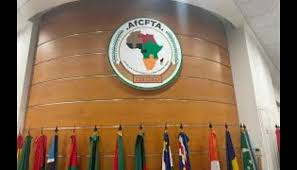Africa is preparing to enter a new phase of digital transformation through the African Continental Free Trade Area (AfCFTA), aiming to access a digital trade market worth $712 billion by the year 2035. The African continent is working closely with key financial institutions and infrastructure partners to boost trade, deepen regional integration, and promote economic sovereignty.
Wamkele Mene, Secretary General of the AfCFTA Secretariat, made this known on Wednesday during the 2025 Afreximbank Annual Meetings (AAM2025) held in Abuja, Nigeria. He said the Protocol on Digital Trade is now a key part of AfCFTA’s long-term plan to open up new economic opportunities for African countries through digital channels. Mene explained that the continent is looking at ways to take advantage of digital services such as online trading, data movement, digital public infrastructure, and investment in data centres.
“Our strategy is focused on helping young African entrepreneurs take part in this booming digital economy,” he said. “We estimate that digital trade will become a $712 billion market by 2035. This presents a huge opportunity not just for youth but for governments, businesses, and investors interested in Africa’s future.”
Mene praised Afreximbank for its support in pushing the AfCFTA agenda forward. He described the bank as an important player in building the financial tools needed to remove trade barriers within the continent. “Without the support of Afreximbank, AfCFTA would struggle. We need trade finance, tools for industrial growth, and green trade support. These are essential for us to compete globally,” he said.
One of the major tools developed in partnership with Afreximbank is the Pan-African Payment and Settlement System (PAPSS). This system allows African countries to make payments to each other using their local currencies instead of relying on foreign ones like the US dollar. Mene said this would help reduce costs and build a more stable financial system that is not at the mercy of global politics.
“It is no longer wise for African countries to be trading with each other using US dollars,” Mene said. “We need to promote our own currencies. This is how we will protect Africa’s economic independence and shield ourselves from international issues that affect global payment systems.”
Mene also announced that the AfCFTA Adjustment Fund has already mobilised $10 billion to support African countries as they implement the trade agreement. From this fund, $1 billion has been set aside as the first phase, known as the ZIP package, to help countries adjust their economies as they remove trade restrictions.
In addition, a $1 billion AfCFTA Automotive Fund has been created to boost local car manufacturing across Africa. The fund will support companies involved in car assembly and the production of spare parts. Mene said that with proper investment and policy support, the automotive sector alone could be worth $46 billion by the year 2035.
The Secretary General said the overall goal is to make Africa stronger economically by ensuring that goods, services, and capital can move freely within the continent. He stressed the importance of African governments taking full ownership of the AfCFTA programme to ensure it succeeds.
The African Continental Free Trade Area is the largest free trade area in the world in terms of participating countries, bringing together 55 member states of the African Union and eight regional economic communities. Its aim is to create a single market for goods and services, with free movement of people and investments to promote industrialisation and sustainable development across Africa.
Stakeholders say the success of this trade agreement depends on strong digital infrastructure, reliable payment systems, political will, and local currency support. With Africa’s young population and growing internet access, the digital economy is seen as a game-changer for the continent.
